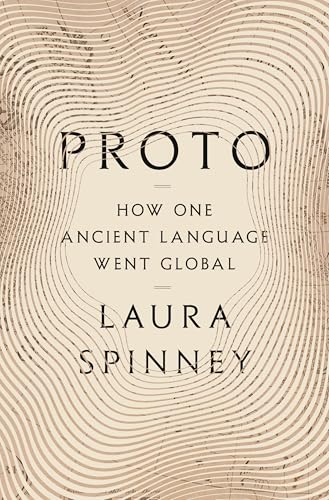Review of Proto: How One Ancient Language Went Global, by Laura Spinney

Proto Synopsis
An engaging look at the mother of almost half of the world’s languages, Proto-Indo-European, and how we are able to track the movements of its pre-historic speakers through the DNA and linguistic clues they left behind. (In other words, Proto is this language-nerd’s personal heaven.)
My Review
For my English degree, I had to get a certain number of Social Studies credits, so I chose to take several anthropology courses. Anthropology is divided into four subfields: archaeology (the study of physical items left behind by ancient peoples), biological anthropology (the study of human biology and behaviour and how they have changed since ancient humans), cultural anthropology (the study of human cultures, societies, and belief systems), and linguistic anthropology (the study of human language and its relationship to culture and social interaction). I took at least one class in each of these fields, and this book incorporates and combines a lot of what I learned in them.
In this book, Spinney takes us on a journey that spans entire continents as well as several millennia. Proto-Indo-European probably originated from a language spoken by a small group of ancient Eastern Europeans, and over time its offspring languages gained strongholds from south and central Asia through the majority of Europe. Hindi, Russian, Farsi, Latin, Greek, Irish, Lithuanian, English… For a long time, certain scholars (including Dante Alighieri way back in the 14th century) have noted puzzling similarities across multiple languages that seem to indicate long-forgotten relationships between their speakers. However, it wasn’t easy to prove ancient interactions until recently, when DNA evidence could finally be examined. These days, it seems like there’s something new to learn about the ancient world every time you turn around!
What I most enjoyed
Spinney lays out the most recent physical evidence of human migration and linguistic evidence of language contact, and she does a good job of offering multiple theories before focusing on her own. There’s still a lot that we don’t know about how, when, and why ancient peoples migrated and why one language survived when another didn’t, but she pieces the puzzle together in a thoughtful, compelling way. I found the section on Celtic languages particularly fascinating, since that’s part of my own ancestry. For instance, she offers some interesting theories on how the Irish language came to be related to the language of a people whose DNA the Irish don’t share.
I also appreciated that she clearly researched the heck out of each of the languages she discusses. Each section is full of literary references as well as general linguistic nerdery, so I couldn’t have been happier. It’s fun to see how words are passed from one language to another slightly changed, like an ancient game of Telephone. And the words that one language shares with another tell us so much about the speakers’ lives. I found it all captivating.
Pardon my soapbox
In her conclusion, Spinney talks about the war in Ukraine. All the recent breakthroughs in the study of Proto-Indo-European point to the steppes of Ukraine as the birthplace of our mother-language. As well as robbing innocent people of their lives and livelihoods, the war is wiping out so much knowledge we could have gained about human history. And for what? For WHAT? War is stupid. It does nothing but leave humanity poorer in every possible way.
While I’m on my soapbox, let me add that all the fretting these days over immigration, racial purity, globalization, and young people changing the meaning of words looks pretty silly when you examine human history. Humans have always migrated for the same reasons they’re migrating today. We’re always looking for a place that feels safe for raising our families, whether that’s safety from natural elements or human conflict. We’ve always exchanged trade goods, terminology, and DNA (wink wink) with the people we find as we travel, too. And until writing came along to provide a long-term record, languages were constantly changing without anyone even noticing. Nothing about the modern world is all that new, really, except instant long-distance communication. So maybe we should all chill a bit, is what I’m saying.
Anyway. Great book, loved every page of it. I highly recommend it to my fellow language nerds! Thank you so much, NetGalley, for the advance copy in exchange for my honest review!
Pre-order Proto now on Bookshop.org* (Release Date: May 13, 2025)
*As an affiliate, I will receive a small commission from any purchase made through this link.